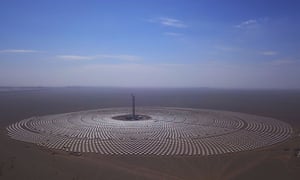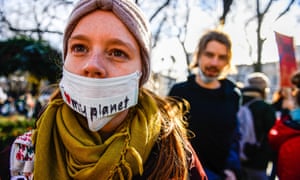Extract from The Guardian
While the world’s leaders fiddle at the UN climate summit, the world outside is giving some reason for hope
Two
great dramas are unfolding. One concerns the future trading status of a
small, rich country, and is marked by febrile debate, political
histrionics and inflated egos. The other sees the rest of the world
trying to control climate change.
The differences between the two shows could not be starker. The UN summit in Katowice, Poland, is a challenge for civilisation, for the benefit of the common good, an existential thriller for 7.5 billion people and all of nature which is being played out in relative calm. In contrast, in Westminster we are witnessing the culmination of a long-running political schism that is of much less consequence to the planet.
Major studies have in the past few weeks made it clearer than ever that we are facing, in David Attenborough’s words at the opening of the summit last week, “a manmade disaster of global scale … our greatest threat in thousands of years”.
First came a UN climate change special report, which showed how we may have only 12 or so years left for global warming to be kept to a maximum of 1.5C, beyond which the risks of floods, drought and extreme heat will increase, and food shortages and poverty are likely for hundreds of millions of people. Then came a Global Carbon Budget study, which showed that, at current trends, the world is heading towards a catastrophic 3C of warming by 2100.
"An unseen revolution is taking place: from denial and inaction just two decades ago, countries now dare to think big"
To add gloom to the pessimism, some of the world’s biggest investors issued a stark warning to governments at the Katowice summit that failure to act urgently would result in financial catastrophe. And the UN’s World Meteorological Organization has
provisionally confirmed that the past four years have been the hottest
on record, and that extreme weather caused by manmade climate change now
affects all continents.The differences between the two shows could not be starker. The UN summit in Katowice, Poland, is a challenge for civilisation, for the benefit of the common good, an existential thriller for 7.5 billion people and all of nature which is being played out in relative calm. In contrast, in Westminster we are witnessing the culmination of a long-running political schism that is of much less consequence to the planet.
Major studies have in the past few weeks made it clearer than ever that we are facing, in David Attenborough’s words at the opening of the summit last week, “a manmade disaster of global scale … our greatest threat in thousands of years”.
First came a UN climate change special report, which showed how we may have only 12 or so years left for global warming to be kept to a maximum of 1.5C, beyond which the risks of floods, drought and extreme heat will increase, and food shortages and poverty are likely for hundreds of millions of people. Then came a Global Carbon Budget study, which showed that, at current trends, the world is heading towards a catastrophic 3C of warming by 2100.
"An unseen revolution is taking place: from denial and inaction just two decades ago, countries now dare to think big"
Taken together, these reports show conclusively that we are on the edge of climate breakdown, and that governments are failing to prevent it. Factor in the dramatic but linked decline in biodiversity, and the potential for collapsed ecosystems and mass extinctions, and we can see we are at an existential crossroads, heading inexorably towards a fatally denuded Earth.
In the middle at Katowice are the 10,000 government negotiators and NGOs trying to make rich countries reduce emissions and help poor countries adapt to inevitable climate change. But these UN climate talks depend on the consensus of all countries, so the progress appears incremental, even glacial. And because they do not involve adversarial politicians, they are considered unimportant by most of the world’s media.
Beyond Katowice, though, are many millions of people who expect their leaders to act in the interests of all, and who are increasingly dismayed that the global economic system threatens everyone’s future. We are now in a race against time to address climate change. We have started late, the signs are not good, and the gap between high-level rhetoric and action to reduce emissions is widening. Fury is now building against governments, with the Extinction Rebellion climate protest group taking non-violent direct action, which has spread to 35 countries in just a few weeks.

There are, however, lots of reasons to believe we can meet the challenge. This year, Trump’s decision to pull the world’s second-biggest carbon emitter out of the Paris agreement to cut emissions has backfired. Not only did US emissions fall in 2018, many US states, cities and businesses said they intended to fulfil their Paris obligations.
The transition to a less carbon-intensive energy system is also gathering pace. The share of renewables in meeting global energy demand is expected to grow by at least one-fifth in the next five years . By 2020 it should be cheaper to build new renewable energy plants in most countries than to keep coal or fossil fuels burning. Countries can already save money by retiring coal plants and substituting wind and solar. Soon only subsidies worth around £5tn a year will keep coal alive in many countries. Even more optimistically, the world’s largest developing countries are now in the forefront of the transition to lower emissions. India and China, with nearly a third of the world’s people, are at the forefront of the next solar revolution and, like Europe, are firmly on the path to decarbonisation.
An unseen revolution is taking place in the way we power the world. From denial and inaction just two decades ago, countries now dare to think big. China is to build a giant solar park in the Gobi desert big enough to power 1 million homes; a single project in India will be even larger, covering 10,000 acres of Rajasthan, and one in the desert near Aswan in Egypt should deliver as much power as two nuclear power stations.
The world is full now of major initiatives. Spurred by the commitments made at the Paris climate meeting in 2015, many countries, for example, are furiously planting trees; carbon capture and storage to take the emissions of fossil fuels is becoming a reality; millions of rice farmers have adopted the system of rice intensification which halves the water needed and reduces methane emissions from rice cultivation by up to 50%. These and many others are, so far, only incremental initiatives, coming far too slowly to even brake the warming. These are the seeds of change, lifting ambition, inspiring hope and showing the potential for change on a planetary scale. They also help politicians and bankers understand that getting to net zero emissions in just 40 years is technically and financially possible, and the best investment any country can ever make.
By the end of the week, Britain may have weathered another political storm and people may be able to see a little clearer what is happening. Perhaps then our politicians will lift their heads and turn to address the greatest challenge any generation is ever likely to face.
They will see that people are up for the challenge. If they then don’t respond with urgency, we are not just metaphorically in the soup, we may literally be cooked.
• John Vidal is a former Guardian environment editor

No comments:
Post a Comment